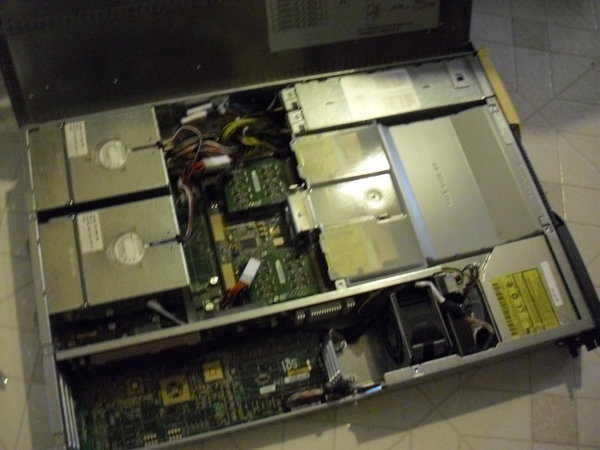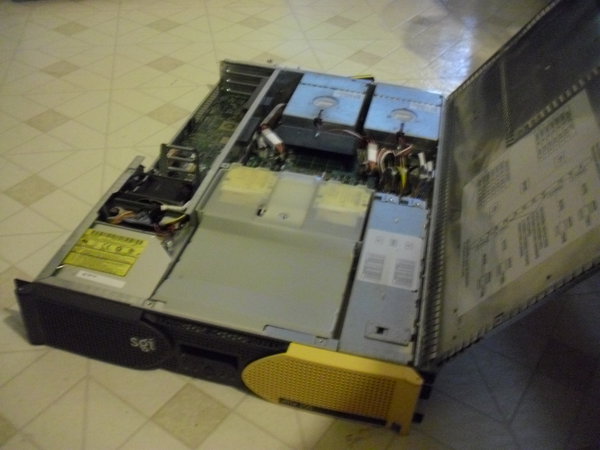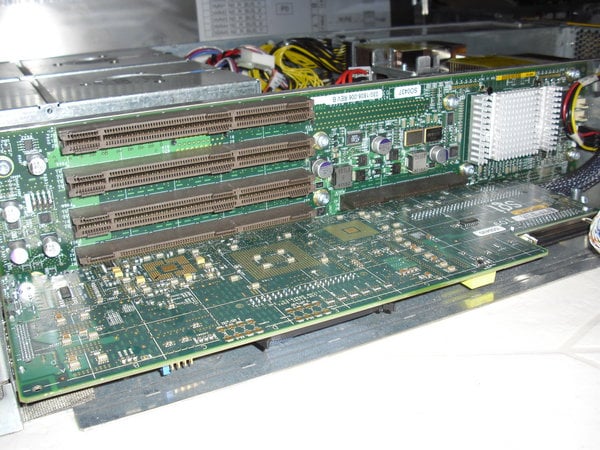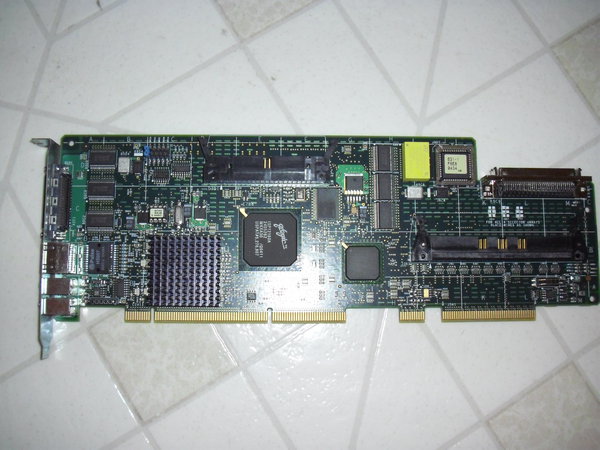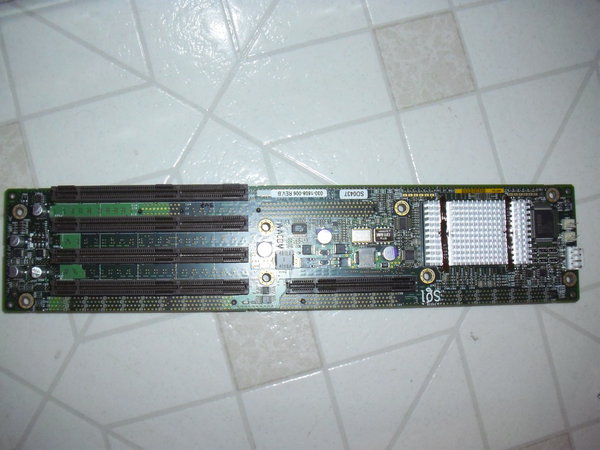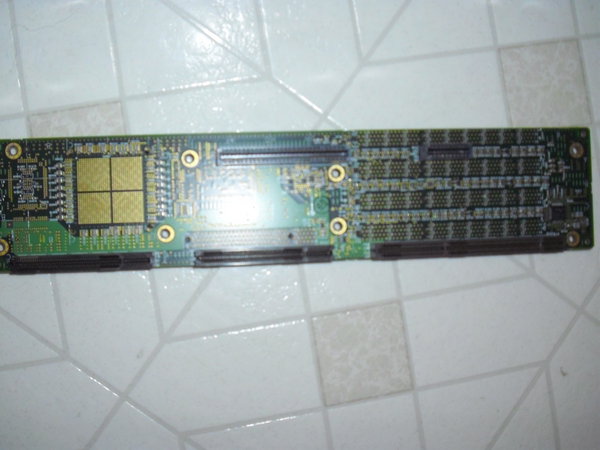Hello all,
I didn't see much info on this while searching through the forums, so if this is a repeat I apologize in advance, but in case it isn't here we go....
I am running an Octane2 with both a V8 and an ESI board. I am told this is an unsupported configuration but it seems to work nicely!! It took a little bit to get it working, namely I only had OpenGL and thus MPlayer, Quake3, etc on the ESI driven monitor (worked intermittently and not much fun). So....I got it to switch over to the V8 by re-symlinking libGL.so and libGLcore.so in:
/var/arch/lib
/var/arch/lib32
/var/arch/lib64
To the ones present in:
/usr/gfx/arch/IP30ODSY
/usr/gfx/arch/IP30ODSY32
/usr/gfx/arch/IP30ODSY64
respectively. After that I didn't even need a reboot and everything just worked. It would seem that the only drawback is that I can't have OpenGL on both screens, but that's fine with me, I'm using the other one for gaim, firefox, etc. You CAN also run at different refresh rates across the two monitors too, so don't worry about that.
To get it running from scratch install the XiO card load IRIX from or boot into the miniroot and do:
keep *
install fresh
This will add the additional drivers you need for the extra card. After it reboots do the fix described above and if your machine works as well as mine did you should be all set! Additionally, you can do:
chkconfig -f xinerama on
to enable xinerama (desktop spanned across both monitors) which also seems to work great.
Let me know if this works for anyone else.
Here's the info on my machine:
I didn't see much info on this while searching through the forums, so if this is a repeat I apologize in advance, but in case it isn't here we go....
I am running an Octane2 with both a V8 and an ESI board. I am told this is an unsupported configuration but it seems to work nicely!! It took a little bit to get it working, namely I only had OpenGL and thus MPlayer, Quake3, etc on the ESI driven monitor (worked intermittently and not much fun). So....I got it to switch over to the V8 by re-symlinking libGL.so and libGLcore.so in:
/var/arch/lib
/var/arch/lib32
/var/arch/lib64
To the ones present in:
/usr/gfx/arch/IP30ODSY
/usr/gfx/arch/IP30ODSY32
/usr/gfx/arch/IP30ODSY64
respectively. After that I didn't even need a reboot and everything just worked. It would seem that the only drawback is that I can't have OpenGL on both screens, but that's fine with me, I'm using the other one for gaim, firefox, etc. You CAN also run at different refresh rates across the two monitors too, so don't worry about that.
To get it running from scratch install the XiO card load IRIX from or boot into the miniroot and do:
keep *
install fresh
This will add the additional drivers you need for the extra card. After it reboots do the fix described above and if your machine works as well as mine did you should be all set! Additionally, you can do:
chkconfig -f xinerama on
to enable xinerama (desktop spanned across both monitors) which also seems to work great.
Let me know if this works for anyone else.
Here's the info on my machine:
Code: Select all
# uname -R
6.5 6.5.30f
# hinv -mv
Location: /hw/node
PM10600MHZ Board: barcode MCY566 part 030-1774-002 rev A
Location: /hw/node/xtalk/15
IP30 Board: barcode JPE588 part 030-1467-001 rev C
Location: /hw/node/xtalk/15/pci/2
FP1 Board: barcode LZF537 part 030-0891-003 rev H
PWR.SPPLY.ER Board: barcode AAE1020875 part 060-0035-002 rev A
Location: /hw/node/xtalk/11
ODY128 Board: barcode KWM926 part 030-1404-003 rev A
Location: /hw/node/xtalk/9
MOT10 Board: barcode JHV680 part 030-1241-002 rev H
1 600 MHZ IP30 Processor
Heart ASIC: Revision F
CPU: MIPS R14000 Processor Chip Revision: 2.4
FPU: MIPS R14010 Floating Point Chip Revision: 0.0
Main memory size: 2048 Mbytes
Xbow ASIC: Revision 1.4
Instruction cache size: 32 Kbytes
Data cache size: 32 Kbytes
Secondary unified instruction/data cache size: 2 Mbytes
Integral SCSI controller 0: Version QL1040B (rev. 2), single ended
Disk drive: unit 1 on SCSI controller 0 (unit 1)
Integral SCSI controller 1: Version QL1040B (rev. 2), single ended
CDROM: unit 2 on SCSI controller 1
IOC3/IOC4 serial port: tty1
IOC3/IOC4 serial port: tty2
IOC3 parallel port: plp1
Graphics board: V8
Graphics board: ESI
Integral Fast Ethernet: ef0, version 1, pci 2
Iris Audio Processor: version RAD revision 12.0, number 1
PCI Adapter ID (vendor 0x10a9, device 0x0003) PCI slot 2
PCI Adapter ID (vendor 0x1077, device 0x1020) PCI slot 0
PCI Adapter ID (vendor 0x1077, device 0x1020) PCI slot 1
PCI Adapter ID (vendor 0x10a9, device 0x0005) PCI slot 3
Code: Select all
# /usr/gfx/gfxinfo
Graphics board 0 is "ODYSSEY" graphics.
Managed (":0.0") 1280x1024
BUZZ version A.1
PB&J version 1
128MB memory
Banks: 4, CAS latency: 3
Monitor 0 type: Unknown
Channel 0:
Origin = (0,0)
Video Output: 1280 pixels, 1024 lines, 100.00Hz (1280x1024_100s)
Graphics board 1 is "IMPACTSR" graphics.
Managed (":0.1") 1280x1024
Product ID 0x2, 1 GE, 1 RE, 0 TRAMs
MGRAS revision 4, RA revision 0
HQ rev B, GE12 rev A, RE4 rev C, PP1 rev H,
VC3 rev A, CMAP rev F, Heart rev F
unknown, assuming 19" monitor (id 0xf)
Channel 0:
Origin = (0,0)
Video Output: 1280 pixels, 1024 lines, 75.92Hz (1280x1024_76_32db)


 It's also worth noting that with the recent rise in copper prices fiber is often much cheaper at great lengths.
It's also worth noting that with the recent rise in copper prices fiber is often much cheaper at great lengths.
 You might also like to know that I have an IBM 8229 token ring to ethernet bridge so I can talk to my old token ring stuff if I get the need and a little thinnet for good measure. The 8229 is definitely worth looking into if you insist on running token ring like I do (got mine for free), just don't expect amazing speed going from token ring to Ethernet if you do that (token ring frames fragment when they're bridged to 10Base). Either way, I understand your addiction and good luck!
You might also like to know that I have an IBM 8229 token ring to ethernet bridge so I can talk to my old token ring stuff if I get the need and a little thinnet for good measure. The 8229 is definitely worth looking into if you insist on running token ring like I do (got mine for free), just don't expect amazing speed going from token ring to Ethernet if you do that (token ring frames fragment when they're bridged to 10Base). Either way, I understand your addiction and good luck!




 (4x Challenge S)
(4x Challenge S)



 Having both Odyssey and Impact cards in the same system can be a little tricky, I posted awhile back on this here:
Having both Odyssey and Impact cards in the same system can be a little tricky, I posted awhile back on this here:









 (x6 Linked)
(x6 Linked)


